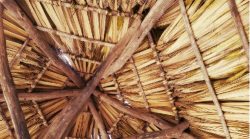By Aileen Wilson.
In December 1971, my husband Peter was employed by Athol Rusden (who used to run a boat service from Auckland to New Caledonia to the New Hebrides) to build some houses on a piece of land he had at Mele. While Peter went up to the New Hebrides I returned to New Zealand to tidy up our affairs there and then, together with our daughter who was just a toddler, I flew from Auckland via Noumea to Vila to join Peter.
When I arrived in Vila in early 1972 a mini-boom was taking place and there was virtually nothing in the way of accommodation available. For the first two weeks we lived in the Vaté Hotel while we waited for a flat it town to be finished for us. We were in Room 5 and beside us in Room 6 was the Price Waterhouse office. The Price Waterhouse Manager and his wife and baby lived in Room 7 and one of the lawyers was living in Room 10 with his offices in Room 11.
Everyone had to have all of their meals over at the Rossi Hotel and that is when we got to meet Yves Rossi and his family.
In those days there were very few telephones in Vila so if we wanted to phone our parents we had to go down to the Post Office to make an appointment to phone New Zealand. Then at the appointed time we had to go and stand and wait and wait in a queue to be able to get through on the telephone. It could take two days to be able to speak to our parents.
After two weeks, the flat in town was still only half finished. On the land at Mele (what is now the Demos property) there were two fâres and, in desperation, we decided to move into one of those. The fâre was one big room with a toilet and bathroom in one corner. It was constructed of cement blocks with a thatched roof and the floor was concrete covered with lino tiles. It had big open windows (no glass) covered in mosquito net and I put up some curtains to keep out the cold. I managed to upholster some nail boxes for little tables and Peter built all of the furniture.
There were three flats, two fâres and four or five houses out at Mele and we relied on generators to provide power. The power used to come on in the morning at about 6:00 and then go off at 10:00am. It came on again in the afternoon about 4:00 and went off at 10:00 at night. So I had to work the washing and cooking of the baby’s food and all of that around the power, but we did have a gas stove so that wasn’t so bad.
We didn’t have a car for a while, but Peter did have a truck and he used to send the driver to pick me up and take me into town to shop and bring me back. There were four supermarkets in those days – Burns Philp, Ballande, Hebrida and a smaller Bon Marché. Produce wasn’t as available in those days as it is now. I recall one occasion when the island ran out of toilet paper and they had to airfreight toilet paper in. That’s very vivid in my mind. Out at Mele, word would go out that the Polynesia was in. The ‘Poly’ was a boat that came up from Sydney once a month and it used to bring fresh produce, but the produce often arrived rather bruised. The fruit and vegetables – that is the imported stuff – used to come into the shops and just went. If you weren’t there when the boxes were opened you would miss out. A Madame Venacasse had a small deli in those days and she used to bring in a variety of fruit, vegetables and deli supplies.
Living out at Mele were accountants and their families, and trust officers and a lawyer and we all socialised together. We used to have great Sunday parties and things like that. It was a great, close-knit community. We called it The Kibbutz.
Copyright Aileen Wilson 2016 All rights reserved.
